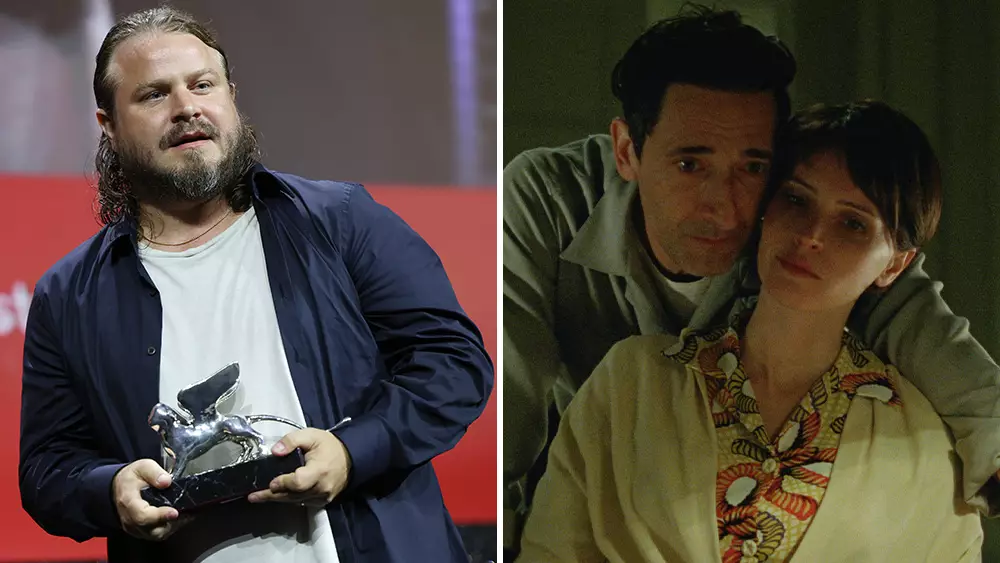Brady Corbet’s latest film, The Brutalist, has been recognized as a significant contender for various awards this season, boasting ten Oscar nominations. Yet, strikingly, this recognition has not translated into financial reward for Corbet, highlighting a peculiar paradox often encountered in the independent filmmaking realm. During a recent appearance on Marc Maron’s WTF podcast, Corbet revealed a startling truth: he and his wife, co-writer and collaborator Mona Fastvold, earned absolutely nothing from their recent cinematic endeavors. This stark reality raises questions about the sustainability of an indie filmmaking career and the industry’s broader economic structure.
While Corbet’s artistic contributions can garner critical acclaim, the fundamental issue remains that many independent filmmakers find themselves subsisting on income from previous projects or alternate work. Corbet spoke candidly about this plight, stating, “I’ve spoken to many filmmakers that have films that are nominated this year that can’t pay their rent.” His experience sheds light on a disheartening trend within the industry wherein creators are compelled to invest months in promotional tours—activities that neither yield immediate financial benefits nor facilitate alternative employment opportunities.
Corbet articulated the exhausting demands of a lengthy promotional schedule, describing it as a “six-month interrogation.” This relentless cycle of interviews and appearances, where he estimates having done around ninety interviews in a week, leaves little room for film directors to engage in writing or other creative pursuits. The director’s frustration is palpable as he reflects on an endless cycle of travel and public engagement with little to no downtime. “I haven’t had a day off since the Christmas break,” he lamented, emphasizing the toll that such promotional commitments can take on one’s personal and professional life.
This situation exacerbates the difficulty for emerging filmmakers, who already face financial constraints at various stages of production. Corbet’s plight is illustrative of a broader problem pervasive in the film industry: while narrative artistry and creative visions are celebratory, the realities of financing these projects remain stark. The rewards of critical acclaim often seem far removed from the day-to-day realities filmmakers endure, leading to mental and emotional strain.
In discussing his artistic vision and thematic focus, Corbet revisited his journey from acting to directing. The Brutalist, a 215-minute narrative featuring the story of László Tóth, a Hungarian Jewish architect grappling with his identity in post-war America, reflects a deeply personal and societal exploration of male ego and the complexity of artistic legacy. His background as an actor shapes his directorial choices, revealing a nuanced understanding of character development and storytelling.
Adding depth to the conversation, Natalie Portman, a former collaborator, praised Corbet’s unique approach in a recent guest column, remarking on how his work is redefining the filmmaking landscape during a time beset by franchise fatigue and algorithm-driven content production. Portman’s endorsement not only underscores Corbet’s artistic merit but also highlights the gap between artistic innovation and the financial ecosystem that often constrains and challenges independent filmmakers.
The economic hardships faced by independent filmmakers like Corbet are not merely personal anecdotes but indicative of a systemic flaw within the industry. As streaming platforms and large production companies dominate content creation, countless talented individuals struggle to be seen or compensated fairly for their work. There exists a pressing need for a reevaluation of how films are produced, marketed, and financed to ensure that rewarding creativity does not come at the expense of artistic freedom and financial security for filmmakers.
In essence, Corbet’s experiences emphasize a notable disconnect between critical praise and tangible economic support for indie filmmakers. As The Brutalist garners accolades and nominations, it is crucial for audiences and industry stakeholders alike to recognize and address the financial disparities that persist in the world of independent film, advocating for a more sustainable future where artistic endeavors can be nurtured and rewarded interdependently.


Leave a Reply